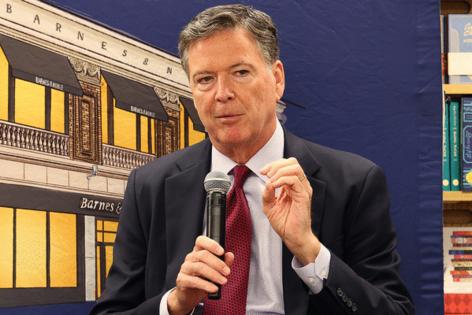Judge dismisses indictments against James Comey, Letitia James
Published in News & Features
WASHINGTON — A federal judge dismissed the criminal charges against former FBI Director James B. Comey and New York Attorney General Letitia James on Monday, finding that the interim U.S. attorney who secured the indictments was illegally appointed.
In two separate orders, Judge Cameron McGowan Currie found that Lindsey Halligan has been “unlawfully” serving as interim U.S. attorney for the Eastern District of Virginia since September, when the Justice Department appointed the Trump ally to the role.
The ruling is a major blow to the two high-profile but much-criticized cases the Justice Department brought after Trump demanded that Attorney General Pamela Bondi prosecute his longtime foes. Both prosecutions have drawn heavy criticism from legal experts.
Comey faced a grand jury indictment on charges he lied to Congress and obstructed a congressional proceeding, while James faced a grand jury indictment in a mortgage fraud case. Both had denied the charges and sought to have the indictments thrown out.
Currie’s orders Monday dismissed the indictments in a way that allows prosecutors to bring new indictments. But there are questions about whether the Comey allegations are now too old to bring because of the statute of limitations.
The judge examined the wording of an 18-year-old statute that governs the attorney general’s ability to temporarily appoint U.S. attorneys without Senate confirmation, known as Section 546, and found it “unambiguous.”
The defense teams had argued that the law limits the Justice Department’s interim appointment power to 120 days total, while the Justice Department had contended the wording allows for an attorney general to make multiple interim appointments and that a new 120-day clock starts for each one.
“The text, structure, and history of section 546 point to one conclusion: the Attorney General’s authority to appoint an interim U.S. Attorney lasts for a total of 120 days from the date she first invokes section 546 after the departure of a Senate-confirmed U.S. Attorney,” Currie wrote.
“If the position remains vacant at the end of the 120-day period, the exclusive authority to make further interim appointments under the statute shifts to the district court, where it remains until the President’s nominee is confirmed by the Senate,” she wrote.
Halligan, the judge found, “was not appointed in a manner consistent with this framework.”
Instead, the 120-day clock started when Halligan’s predecessor, who did not pursue charges against Comey or James, was appointed to the role in January.
“When that clock expired on May 21, 2025, so too did the Attorney General’s appointment authority,” Currie wrote.
Lawmakers amended the attorney general’s interim appointment power in 2007 through a piece of legislation known as the Preserving United States Attorney Independence Act. Congress wanted to act after a provision included in a 2006 reauthorization of the PATRIOT Act allowed the attorney general to appoint interim U.S. attorneys for an indefinite period.
Currie also pointed to what lawmakers at the time said they intended to accomplish with the 2007 law, according to the congressional record. Key supporters of the legislation, according to the congressional record, said they wanted to restore a 120-day cap on the executive branch’s appointment power when it came to interim U.S. attorneys.
Currie, a Clinton appointee who sits in the U.S. District Court for the District of South Carolina, oversaw this part of the Comey and James cases as it relates to complaints about Halligan’s appointment. The judge described Halligan’s appointment as “defective” and said actions that stemmed from her appointment “constitute unlawful exercises of executive power and must be set aside.”
Halligan, a former White House aide, did not have any prior prosecutorial experience when she was appointed by Bondi as interim U.S. attorney. But after taking the role, Halligan quickly brought charges against Comey and later secured an indictment against the New York state attorney general.
Halligan is one of several top prosecutors to be challenged on their appointment, and one of several who have been found to be in the role illegally. Although the details vary, Trump administration-appointed U.S. attorneys in New Jersey, Nevada, California and New Mexico have faced motions challenging the lawfulness of their appointments.
©2025 CQ-Roll Call, Inc., All Rights Reserved. Visit cqrollcall.com. Distributed by Tribune Content Agency, LLC.












Comments